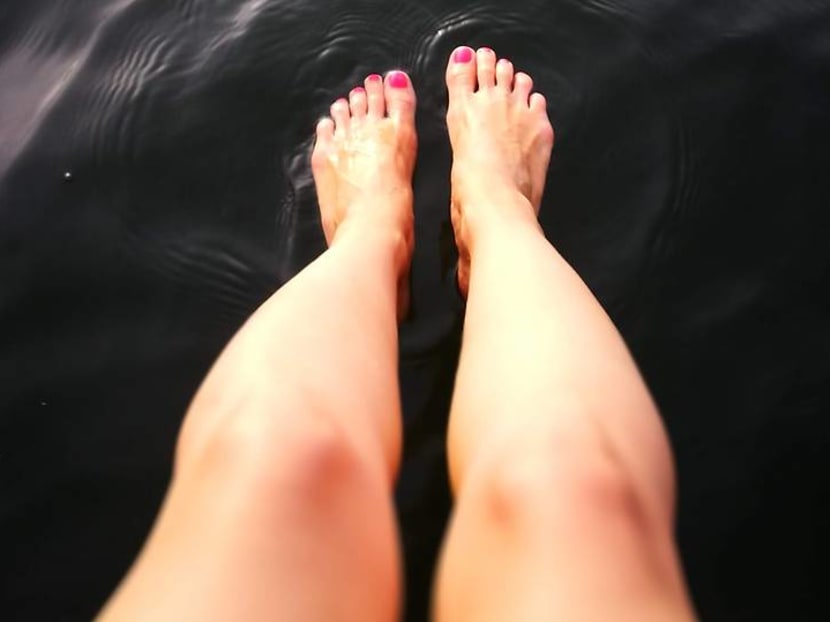What causes water retention and how to deal with swollen ankles and fingers
From salty food to gravity, experts explain the reasons behind edema – and why drinking less doesn’t really help.

(Photo: Unsplash/Liliya Dyulgerov)
If you've ever spent an afternoon on the couch with the TV and a bag of salted chips, or gone to bed with a belly full of Teochew porridge and its accoutrements of salted eggs, fish, vegetables and cured meats, you’re probably familiar with the feeling.
You wake up the next morning feeling puffed up and heavier than usual. Your ring feels like it's strangling your finger. Instead of ankles, you now have cankles. And when you press on the swollen areas for a few seconds, you get weird temporary dimples. In other words, you could very well stand in for the Michelin Man.
That’s water retention or edema in action.
WATER RETENTION CAUSE #1: SALT
The most common cause for edema is eating too much sodium-loaded food. This upsets your body's sodium-to-water balance, which it needs to function. As a result, your body produces an anti-diuretic hormone (ADH) that nudges the kidneys to hold on to water if the water content in our blood is lower than usual, said Associate Professor Chionh Chang Yin, the chief of Changi General Hospital’s Department Of Renal Medicine.
READ: Beauty Fixes: How to sort out that puffy face and bloated situation in 4 weeks
Once you have drunk adequate fluids and the water content in the blood is restored, your body stops secreting ADH, he said. In that sense, it doesn't really help for you to drink less water to minimise edema.
But edema isn’t just about your body holding on to insufficient fluids. It also has something to do with how fluids are diverted and pooled in certain parts of the body, which leads us to the next point below.
WATER RETENTION CAUSE #2: GRAVITY
If you’ve been standing a lot and have swollen ankles or legs, that’s gravity's effect on your body's fluids. “It reflects a shift of water between physical compartments within the body, and in this case, it is related to gravity,” said Dr Chionh.
The increased volume of blood in your legs and feet raises the pressure inside the blood vessels. “The excess fluid in the blood vessels then leaks out into the tissue in the legs, causing them to swell.” This may explain the swelling in the lower legs some runners experience after running.
And it’s not just water. “Edema may be a result of more blood flowing down to the legs than the blood flowing up from it,” said Dr Ian Phoon, who heads the Cardiovascular Diseases Workgroup at SingHealth Polyclinics.

WATER RETENTION CAUSE #3: HORMONES (FOR WOMEN)
For women, edema could sometimes be part of the dreaded premenstrual syndrome or PMS. “Some women may observe a gain of 1kg to 2kg, which is gradually lost once menstruation begins. Such rapid change in weight is likely due to the change of the water retention status,” said Dr Phoon.
But he added that you can’t always blame edema for the bloated feeling as it could also "be a feeling of gas in the stomach or a feeling of indigestion”.
Your body doesn't produce more fluids when you have edema; instead, it stores and channels fluids. But pregnancy is a time when your body actually produces fluids – about 50 per cent more blood and body fluids, according to the American Pregnancy Association.
The extra fluid is needed to soften the body and enable it to expand as the baby develops. "Extra fluid also helps prepare the pelvic joints and tissues to open for delivery. The extra fluids account for approximately 25 per cent of the weight women gain during pregnancy," noted its website.
WATER RETENTION CAUSE #4: CERTAIN MEDICINES
Certain medicines can cause edema as a side effect. The Mayo Clinic website lists, among others: High blood pressure medicines, nonsteroidal anti-inflammatory medicines, steroids, oestrogens and certain diabetes medicines known as thiazolidinediones.
HOW TO SOLVE EDEMA?
It should be as easy as holding back on those chips and going to the toilet more, right? Unfortunately, the science isn’t like that. For starters, your body is made of a lot of water.
About 60 per cent of your body consists of water, said Dr Phoon. “About 5 litres of water is in the blood vessels, while the rest are in the cells, organs, and tissues of the body.”
READ: Is heavy menstrual bleeding normal? And what does eating pineapple have to do with it?
And while this percentage can be lower in those who are obese and slightly lower in women than in men, he said, it doesn’t change much no matter how much water you drink or don’t.
But relieving edema is actually quite simple: “By elevating one's legs (and reversing the effects of gravity), or wearing compression stockings during prolonged standing”, said Dr Phoon. “Moving the muscles of the affected limbs also helps to ‘pump’ the excess fluids away.”
BUT TAKE NOTE OF MORE SERIOUS WATER RETENTION ISSUES
However, “persistent or severe edema” warrants a consultation with a doctor, said Dr Phoon, as there are many possible causes, including “serious underlying medical conditions such as heart failure or kidney damage”.
Meanwhile, Dr Chionh advised that if a swelling in the leg or body is accompanied by other symptoms such as “markedly frothy urine, breathlessness or reduced tolerance of physical activity”, it may suggest edema related to an underlying medical condition.





